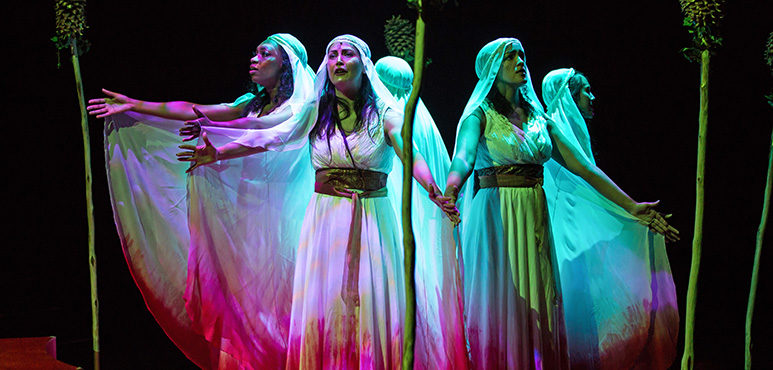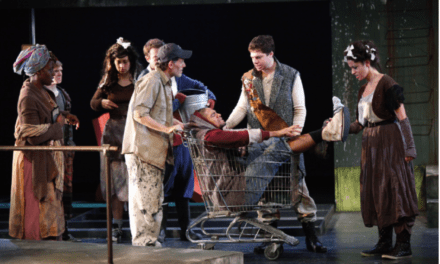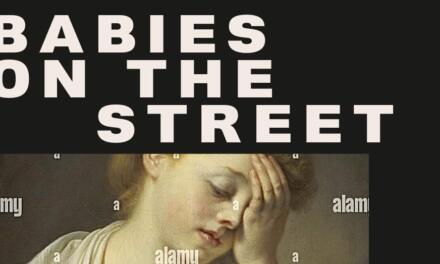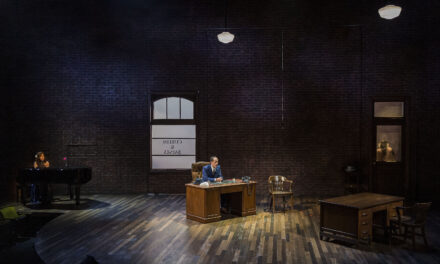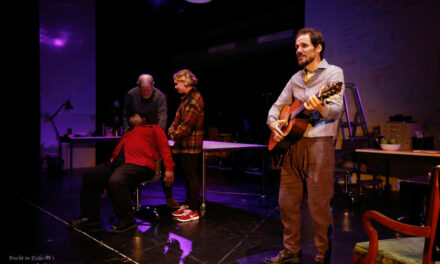“Beginnings have their own
energy,
ethics,
tonality,
colour.”
–excerpt from Anne Carson’s translator’s note to 2016 republication of Bakkhai
The Bacchae by Euripides has a new translation by award-winning Canadian poet, essayist, translator, playwright and classicist, Anne Carson. Bakkhai premiered in 2015 in London, but now under the direction of Jillian Keiley, the stunning and disturbing production that Dionysos himself describes as “in the clear key of green,” finds itself home in Canada at the Tom Patterson theatre for the 2017 Stratford Festival.
Bakkhai tells the tragic downfall of Pentheus, king of Thebes, and his mother, Agave, at the hands of the god of wine, fertility, theatre, and ritual ecstasy: Dionysos. Dionysos arrives in Thebes to confront allegations made by Agave and her sisters that he is not the son of Zeus. He intends initially to “thrill you, Thebes” but finding instead an arrogant Pentheus as king, the daimon’s (as he calls himself) revenge grows to a climactic frenzy. Pentheus rails against the worship of Dionysos, sneering to the audience:
“There’s a lot of wine involved and creeping off into corners with men.
Meanwhile they call themselves a prayer group!
Obviously it’s just sex.” (Carson 20)
Pentheus imprisons the women of Thebes, including his own mother, whom he says has “gone crazy” but when he attempts to confine Dionysos, they escape with the aid of the god. Dionysos appears to reason with Pentheus and offer the last chance to honor the gods but is dismissed and ridiculed. Lured in part by Dionysos and part by his own voyeuristic desires, Pentheus goes to Mt Kithairon dressed as a woman in hopes of witnessing their “obscene goings-on.”
Hiding in a pine tree, he is revealed to the women by the God and brutally torn apart, his own mother carrying off his head as her prize. She brings it to Kadmus, her father, as a trophy, believing it to be the head of a lion. As she comes back to her own mind, Agave realizes what she has done. Dionysos banishes Agave from Thebes and transforms Kadmus and his wife to serpents. All through the play, the followers of Dionysos act as Greek chorus watching and commenting on the action. They dance in silk dresses with the thyrsos, which is simultaneously the pine groves below Mt Kithairon, a staff of magic, and a deadly weapon wreathed in greenery and dripping honey.
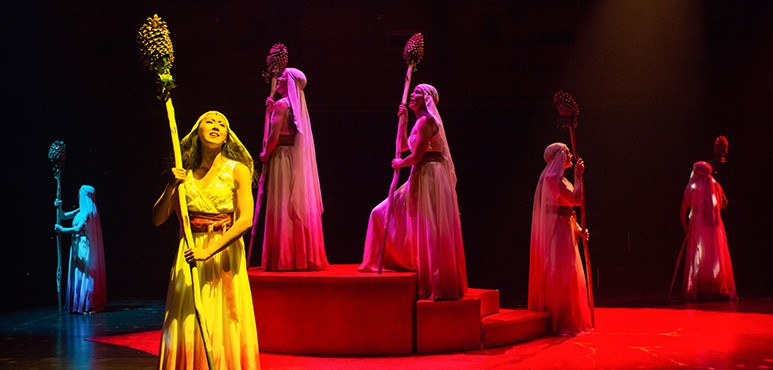
Members of the company. Photography by Cylla von Tiedemann
The play moves with an intensity that is ecstatic and disturbing (if those two descriptors are even distinct from one another), the lighting and music dizzying. There are signs warning the audience for sexuality, eroticism, violence, and other mature themes. Keiley sets the words of the choral odes to music—a wonderful interpretation of Anne Carson’s poetry—with drum beats which evoke anything from a heartbeat to a rave. The sensual ever present Bahkkai set the pace for the production, their songs punctuating the action, their dances inviting the audience into a trance. Sensuality oozes from the characters, although the choreographer’s approach to the erotic holds the performance firmly in check. Covered by Jackie Sharkey from CBC news, Stratford Festival hired “intimacy choreographer” Tonia Sina to direct the eroticism on stage. The result is a sensual collage of movement, carefully timed and structured according to scales of intensity and duration, with clear boundaries in place for the safety of the actors.
It is Bakkhic ecstasy, and it builds like a climax, thrumming with music and motion, from the first appearance of Dionysos, to Pentheus’ attempts to squash the Bakkhic revolution, to finally a startling silence when a servant describes how Pentheus reached to touch his mother’s cheek before she viciously tore his arm from his body.
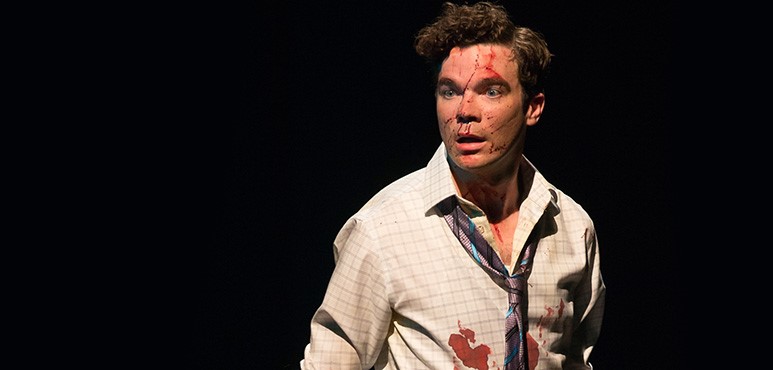
André Morin as the Servant. Photography by Cylla von Tiedemann
The duality of human nature to be civilized and wild, to have both incredible beauty and violence within us is a fundamental question of the production. Agave’s character, for example, moves from the climax of triumph when she revels in her hunt, to the depths of despair and desolation as she realizes her son’s severed head lays in her hands. The pendulum swinging wildly from pinnacle to chasm seems almost cruelly impossible, and yet this is the worship Dionysos demands: absolute submission.
Bakkhai resonates with current global political climates in its representation of men in power, as the entire story is a battle for adoration and worship between two men, playing itself out on women’s bodies. Pentheus himself is a political leader dismissive of foreigners and obsessed with controlling the sexuality of his mother and sisters (indeed, all women,) yet all too eager to spy on their so-called obscenities and masturbate on stage moments after railing against the idea of women drinking. Dionysos, on the other hand, literally does control the bodies of his female followers (as well as Pentheus). Still, the Bakkhai themselves appear to claim the sexual, physical, and spiritual power of their own as:
“They’ve forsaken their shuttles
they’ve left their looms,
they’ve dropped their aprons
and taken up their stations
on Dionysos’ mountain!” (Carson 17)
Kim Solga in the programme urges the audience to consider this as “the most political play you will see this year” and to “watch this performance with your pussyhat on.” While the play is certainly not feminist, the erotic spectacle is certainly female oriented, with many moments where the Bakkhai take their pleasure and power in their own hands.
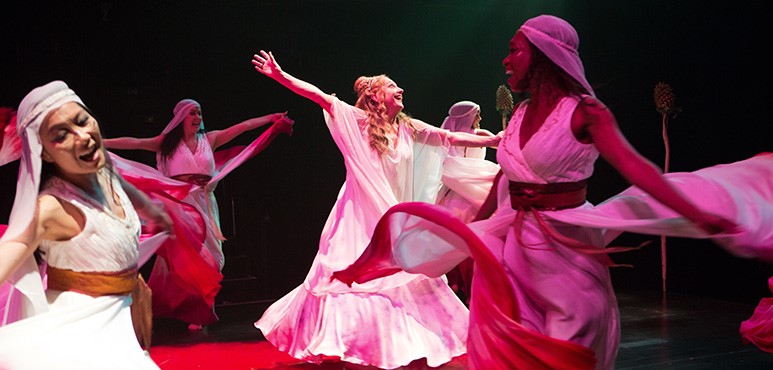
Lucy Peacock (centre) as Agave with members of the company. Photography by Cylla von Tiedemann
The translator, Anne Carson, is known primarily in the theatre world for her innovative translations of Ancient Greek tragedies including Sophokles’ Antigone, An Oresteia (a trilogy adapted from Aeschylus’ Agamemnon, Sophokles’ Elektra, and Euripides’ Orestes), and Grief Lessons: Four Plays by Euripides. Fans of her written work appreciate its visual appeal as her printed words falls with often disturbing power and beauty on the page. Nox, for example, an exploration of translating Catullus’ Poem 101, is also an epitaph made of scraps of paper, photos, and pressings on a single, expansive accordion page. In the theatre, however, her translations of the Ancient Greek take on accessible, exciting, and powerful embodied forms.
One of Carson’s more notable choices in her dramatic translations can be found in her interpretation of Elektra in An Oresteia. Elektra is continuously manipulated, discarded, and deprived of action, so that the only ability she does appear to have is to make noise. As Carson explains in her 2009 forward to the translation: “This is not a person who would say Woe is me!” and so Carson transliterates Elektra’s screams letter for letter, rather than inserting contemporary phrases of grief. We get the rich, textured, unsettling sound of each scream. Bakkhai is no exception to this treatment. Calls of “EUOI”, “IO” “A” and “EA” resound throughout the theatre as the Bakkhai call to one another at the foot of Mt Kithairon. Kadmus grieves for his grandson with cries of “PHEU,” the vowels dissecting his sorrow like Pentheus’ strewn body parts. The tragedy culminates in fully fleshed sorrow.
“If life is a stage,
that is the show.
Exit Dionysos.”
–excerpt from Anne Carson’s translator’s note to 2016 republication of Bakkhai
The Stratford Festival in Stratford, Ontario is North America’s largest classical repertory theatre company, emphasizing production of classics, musicals, contemporary drama, and (as can be deduced from their name) Shakespeare.
Carson, Anne. Bakkhai. London: Oberon Classics, 2015.
This post was written by the author in their personal capacity.The opinions expressed in this article are the author’s own and do not reflect the view of The Theatre Times, their staff or collaborators.
This post was written by Megan De Roover.
The views expressed here belong to the author and do not necessarily reflect our views and opinions.

